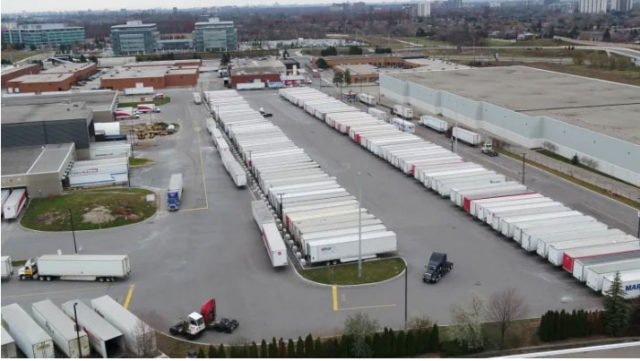
Friday, November 16 ~ NATIONAL.
by Mary P Brooke ~ West Shore Voice News
Sending a gift parcel for Christmas has ironically come full circle. As the Internet took hold in people’s social and economic lives from the late 1990s to now, the trend was first about sending digital gifts (money, gift cards, e-cards) to avoid the cost and inconvenience of shopping (whether online or in stores) and the cost and hassle of mailing.
Fast-forward to 2018 we see how slick e-commerce functionality has entrenched itself into seasonal gift-giving. Ironically, online shopping depends equally so on delivery IRL (in real life) where Canada Post as a Crown corporation has seen a fortunate resurrection of its revenues that plummeted as email overtook first class postal mail. The victory here for consumers is avoiding long lineups at the post office to mail parcels ahead of deadlines. For Canada Post it has meant production system adjustments.
 But the pitfall for consumers is now relying on Canada Post to be the main handler of online purchase deliveries. With an escalation of rotating strikes by the Canadian Union of Postal Workers (CUPW) that began October 22, as of November 16 this sees a backlog of now 1.5 million parcels stored in delivery containers (600 containers each with about 2,500 parcels) by Canada Post across Canada. Canada Post has even now asked 190 countries around the world to halt all parcel shipments into Canada until matters are resolved.
But the pitfall for consumers is now relying on Canada Post to be the main handler of online purchase deliveries. With an escalation of rotating strikes by the Canadian Union of Postal Workers (CUPW) that began October 22, as of November 16 this sees a backlog of now 1.5 million parcels stored in delivery containers (600 containers each with about 2,500 parcels) by Canada Post across Canada. Canada Post has even now asked 190 countries around the world to halt all parcel shipments into Canada until matters are resolved.
And in BC the uncertainty caused by the rotating strike action has also likely contributed to the lower-than-expected return rate of Electoral Reform ballots to Elections BC. Ballots were first available October 22 and the current deadline for return is November 30. About 18% of voter packages had been received by Elections BC (with 7.9% of those opened and processed) by the morning of November 16.
Which leads to the idea of what is considered an essential service in Canada, beyond the reach of a labour strike. On November 16 — with a November 17 deadline looming (midnight, Eastern Standard Time) — Prime Minister Trudeau had said last week that “all options will be on the table” to end postal disruptions if negotiations between Canada Post and CUPW are not successful by that time. That includes legislating CUPW employees back to work.
If in fact the entire seasonal economy and the social fabric of the holiday season are impacted, in the modern 21st century the delivery of parcels in peak season could in fact be seen as an essential service.
The strikes are now into their fourth week and have touched virtually every Canada Post facility and every Canadian address so far, says Canada Post. “The union’s strikes continue to cause unprecedented backlogs in our delivery network,” it was stated by Canada Post in a news release.
Back-to-work legislation imposed upon workers is often seen as diluting the power of collective bargaining. Worker demands might be valid (e.g. concerns that some delivery personnel must walk 30 km each day to fulfill routes or that rural post office workers — many being women — are unduly impacted in favour of urban). But also it’s valid to keep the operations of a major company flowing, so that everyone has an income and customers are serviced. Canada Post has approximately 42,000 urban employees and 8,000 rural and suburban carriers. Virtually everyone in Canada is serviced by Canada Post in some way or another.
Back-to-work legislation is not new and it always seems jarring. But as socioeconomic systems evolve, this readiness by the federal government to keep things flowing (even though it appears to trump workers’ rights) seems in keeping with a new social direction to resolve conflicts through discussion and conciliatory agreement rather than management-worker conflict.
Inherent in this new direction is both sides realizing the big-picture impact of their internal dispute (a form of victim-impact realization, if you will).
Not getting a Christmas gift parcel on time is spearheading the pain. But people are paying attention to this dispute resolution for more than the restored flow of parcels. It’s about seeing a more authentic realization of broad-scope economic impacts of what two front-line players (in this case Canada Post and CUPW) see as their own internal dispute.
People might think this bends or breaks union strength, but it equally forces large corporations to see a broader social-impact responsibility. It leads both sides to realize their common goal to survive themselves while serving a mutually-necessary customer base that in turn drives the wheels of economy and social activity.
There is some progress — a recognition of broader factors: “There is no reason to halt international shipments,” said CUPW president Mike Palecek in a statement this week. “Let us solve our issues at the bargaining table.” But that ignores the reality of physical demands in the system — a backlog of parcels already reaching storage capacity by the corporation (presumably both availability of space and parcel security) that the corporation must contend with responsibly.
As a footnote, small businesses and mid-size companies that do not employ unionized workers today often use shared-profit incentives and good old-fashioned awareness of shared goals to keep their enterprises moving forward. The idea of a labour strike seems binary and outmoded where instead a discussion of shared values and a realistic understanding of fiscal responsibility can — with modern leadership — be undertaken by all parties that play into the success of running an operation that delivers a service.
Copyright 2018 WEST SHORE VOICE NEWS


